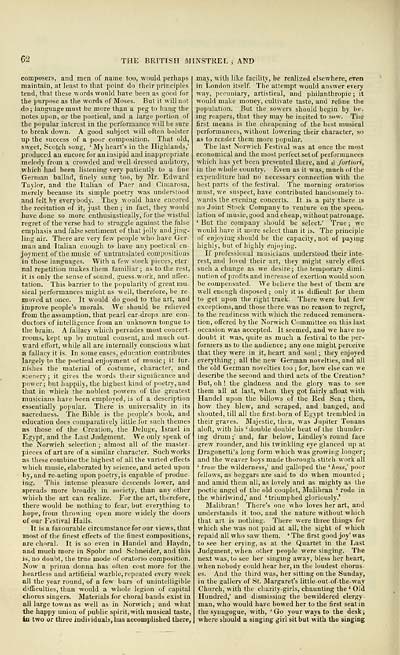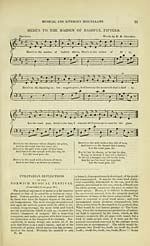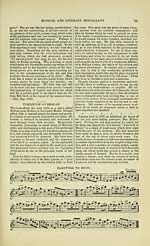Glen Collection of printed music > Printed music > British minstrel, and musical and literary miscellany
(400) Page 62
Download files
Complete book:
Individual page:
Thumbnail gallery: Grid view | List view

52
THE BRITISH MINSTREL ; AND
composers, and men of name too, would perhaps
maintain, at least to that point do their principles
tend, that these words would have been as good for
the purpose as the words of Moses. But it will not
do; language must be more than a peg to hang the
notes upon, or the poetical, and a large portion of
the popular interest in the performance will be sure
to break down. A good subject will often bolster
up the success of a poor composition. That old,
sweet, Scotch song, ' My heart's in the Highlands,'
produced an encore for an insipid and inappropriate
melody from a crowded and well-dressed auditory,
which had been listening very patiently to a fine
German ballad, finely sung too, by Mr. Edward
Taylor, and the Italian of Paer and Cimarosa,
merely because its simple poetry was understood
and felt by everybody. They would have encored
the recitation of it, just then ; in fact, they would
have done so more enthusiastically, for the wistful
regret of the verse had to struggle against the false
emphasis and false sentiment of that jolly and jing-
ling air. There are very few people who have Ger-
man and Italian enough to have any poetical en-
joyment of the music of untranslated compositions
in those languages. With a few stock pieces, eter-
nal repetition makes them familiar ; as to the rest,
it is only the sense of sound, guesswork, and atl'ec-
tation. This barrier to the popularity of great mu-
sical performances might as well, therefore, be re-
moved at once. It would do good to the art, and
improve people's morals. We should be relieved
from the assumption, that pearl ear-drops are con-
ductors of intelligence from an unknown tongue to
the brain. A fallacy which pervades most concert-
rooms, kept up l)y mutual consent, and much out-
ward effort, while all are internally conscious what
a fallacy it is. In some cases, education contributes
largely to the poetical enjoyment of music; it iur-
nishes the material of costume, character, and
fic-enery ; it gives the words their significance and
power; but happily, the highest kind of poetry, and
that in which the noblest powers of the greatest
musicians have been employed, is of a description
essentially popular. There is universality in its
saeredness. 'The Bible is the people's book, and
education does comparatively little for such themes
as those of the Creation, the Deluge, Israel in
Egypt, and the Last Judgment. We only speak of
the Norwich selection ; almost all of the master-
pieces of art are of a similar character. Such works
as these combine the highest of all the varied efi'ects
which music, elaborated by science, and acted upon
by, and re-acting upon poetry, is capable of produc-
ing. This intense pleasure descends lower, and
spreads more bn»adly in society, than any other
which the art can realize. For the art, therefore,
there would be nothing to fear, but everything to
hope, from throwing open more widely the doors
of our Festival Halls.
It is a favourable circumstance for our views, that
most of the finest efl'ects of the finest compositions,
are choral. It is so even in Handel and Haydn,
and much more in Spohr and Schneider, and this
is, no doubt, the true mode of oratorio composition.
Now a prima donna has often cost more for the
heartless and artificial warble, repeated every week
all the year round, of a few bars of unintelligible
difficulties, than would a whole legion of capital
chorus singers. Materials for choral bands exist in
all large towns as well as in Norwich ; and what
the happy union of public spirit, with musical taste,
in two or three individuals, has accomplished there,
may, with like facility, be realized elsewhere, even
in London itself. The attempt would answer every
way, pecuniary, artistical, and philanthropic ; it
would make money, cultivate taste, and refine the
population. But the sowers should begin by be.
ing reapers, that they may be incited to sow. The
first means is the cheapening of the best musical
performances, without lowering their character, so
as to render them more popular.
The last Norwich Festival was at once the most
economical and the most perfect set of performances
which has yet been presented there, and d fortiori,
in the whole country. Even as it was, much of the
expenditure had no necessary connection with the
best parts of the festival. The morning oratorios
must, we suspect, have contributed handsomely to-
wards the evening concerts. It is a pity there is
no Joint Stock Company to venture on the specu-
lation of music, good and cheap, without patronage,
' But the company should be select.' True ; we
would have it more select than it is. The principle
of enjoying shimld be the capacity, not of paying
highly, but of highly enjoying.
If professional musicians understood their inte-
rest, and loved their art, they might surely efl'ect
such a change as we desire; the temporary dimi-
nution of profits and increase of exertion would soon
be compensated. We believe the best of them are
well enough disposed ; only it is difficult for them
to get upon the right track. There were but few
exceptions, and those there was no reason to regret,
to tlae readiness with which the reduced remunera.
tion, ofl'ered by the Norwich Committee on this last
occasion was accepted. It seemed, and we have no
doubt it was, quite as much a festival to the per-
formers as to the audience; any one might perceive
that they were in it, heart and sonl ; they enjoyed
everything ; all the new German novelties, and all
the old German novelties too ; for, how else can we
describe the second and third acts of the Creation?
But, oh ! the gladness and the glory was to see
them all at last, when they got fairly afloat with
Handel upon the billows of the Red Sea; then,
how they blew, and scraped, and banged, and
shouted, till all the first-born of Egypt trembled in
their graves. Blajestic, then, was Jupiter Tonans
aloft, with his ' double double beat of the thunder-
ing drum ;' and, far below, Lindley's round face
grew rounder, and his twinkling eye glanced up at
Dragonetti'3 long form which was growing longer;
and the weaver boys made thorough-stitch- work all
' trow the wilderness,' and galloped the ' hoss^ poor
fellows, as beggars are said to do when mounted ;
and amid them all, as lovely and as mighty as the
poetic angel of the old couplet, Malibran ' rode in
the whirlwind,' and 'triumphed gloriously.'
Malibran! There's one who loves her art, and
understands it too, and the nature without which
that art is nothing. There were three things for
which she was not paid at all, the sight of which
repaid all who saw them. ' The first good joy' was
to see her crying, as at the Quartet in the Last
Judgment, when other people were singing. The
next was, to see her singing away, bless her heart,
when nobody could hear her, in the loudest chorus-
es. And the third was, her sitting on the Sunday,
in the gallery of St. Margaret's little -out-of-the-way
Church, witii the charity-girls, chaunting the ' Old
Hundred,' and dismissing the bewildered clergy-
man, who would have bowed her to the first seat in
the synagogue, with, 'Go your ways to the desk;
where should a singing girl sit but with the singing
THE BRITISH MINSTREL ; AND
composers, and men of name too, would perhaps
maintain, at least to that point do their principles
tend, that these words would have been as good for
the purpose as the words of Moses. But it will not
do; language must be more than a peg to hang the
notes upon, or the poetical, and a large portion of
the popular interest in the performance will be sure
to break down. A good subject will often bolster
up the success of a poor composition. That old,
sweet, Scotch song, ' My heart's in the Highlands,'
produced an encore for an insipid and inappropriate
melody from a crowded and well-dressed auditory,
which had been listening very patiently to a fine
German ballad, finely sung too, by Mr. Edward
Taylor, and the Italian of Paer and Cimarosa,
merely because its simple poetry was understood
and felt by everybody. They would have encored
the recitation of it, just then ; in fact, they would
have done so more enthusiastically, for the wistful
regret of the verse had to struggle against the false
emphasis and false sentiment of that jolly and jing-
ling air. There are very few people who have Ger-
man and Italian enough to have any poetical en-
joyment of the music of untranslated compositions
in those languages. With a few stock pieces, eter-
nal repetition makes them familiar ; as to the rest,
it is only the sense of sound, guesswork, and atl'ec-
tation. This barrier to the popularity of great mu-
sical performances might as well, therefore, be re-
moved at once. It would do good to the art, and
improve people's morals. We should be relieved
from the assumption, that pearl ear-drops are con-
ductors of intelligence from an unknown tongue to
the brain. A fallacy which pervades most concert-
rooms, kept up l)y mutual consent, and much out-
ward effort, while all are internally conscious what
a fallacy it is. In some cases, education contributes
largely to the poetical enjoyment of music; it iur-
nishes the material of costume, character, and
fic-enery ; it gives the words their significance and
power; but happily, the highest kind of poetry, and
that in which the noblest powers of the greatest
musicians have been employed, is of a description
essentially popular. There is universality in its
saeredness. 'The Bible is the people's book, and
education does comparatively little for such themes
as those of the Creation, the Deluge, Israel in
Egypt, and the Last Judgment. We only speak of
the Norwich selection ; almost all of the master-
pieces of art are of a similar character. Such works
as these combine the highest of all the varied efi'ects
which music, elaborated by science, and acted upon
by, and re-acting upon poetry, is capable of produc-
ing. This intense pleasure descends lower, and
spreads more bn»adly in society, than any other
which the art can realize. For the art, therefore,
there would be nothing to fear, but everything to
hope, from throwing open more widely the doors
of our Festival Halls.
It is a favourable circumstance for our views, that
most of the finest efl'ects of the finest compositions,
are choral. It is so even in Handel and Haydn,
and much more in Spohr and Schneider, and this
is, no doubt, the true mode of oratorio composition.
Now a prima donna has often cost more for the
heartless and artificial warble, repeated every week
all the year round, of a few bars of unintelligible
difficulties, than would a whole legion of capital
chorus singers. Materials for choral bands exist in
all large towns as well as in Norwich ; and what
the happy union of public spirit, with musical taste,
in two or three individuals, has accomplished there,
may, with like facility, be realized elsewhere, even
in London itself. The attempt would answer every
way, pecuniary, artistical, and philanthropic ; it
would make money, cultivate taste, and refine the
population. But the sowers should begin by be.
ing reapers, that they may be incited to sow. The
first means is the cheapening of the best musical
performances, without lowering their character, so
as to render them more popular.
The last Norwich Festival was at once the most
economical and the most perfect set of performances
which has yet been presented there, and d fortiori,
in the whole country. Even as it was, much of the
expenditure had no necessary connection with the
best parts of the festival. The morning oratorios
must, we suspect, have contributed handsomely to-
wards the evening concerts. It is a pity there is
no Joint Stock Company to venture on the specu-
lation of music, good and cheap, without patronage,
' But the company should be select.' True ; we
would have it more select than it is. The principle
of enjoying shimld be the capacity, not of paying
highly, but of highly enjoying.
If professional musicians understood their inte-
rest, and loved their art, they might surely efl'ect
such a change as we desire; the temporary dimi-
nution of profits and increase of exertion would soon
be compensated. We believe the best of them are
well enough disposed ; only it is difficult for them
to get upon the right track. There were but few
exceptions, and those there was no reason to regret,
to tlae readiness with which the reduced remunera.
tion, ofl'ered by the Norwich Committee on this last
occasion was accepted. It seemed, and we have no
doubt it was, quite as much a festival to the per-
formers as to the audience; any one might perceive
that they were in it, heart and sonl ; they enjoyed
everything ; all the new German novelties, and all
the old German novelties too ; for, how else can we
describe the second and third acts of the Creation?
But, oh ! the gladness and the glory was to see
them all at last, when they got fairly afloat with
Handel upon the billows of the Red Sea; then,
how they blew, and scraped, and banged, and
shouted, till all the first-born of Egypt trembled in
their graves. Blajestic, then, was Jupiter Tonans
aloft, with his ' double double beat of the thunder-
ing drum ;' and, far below, Lindley's round face
grew rounder, and his twinkling eye glanced up at
Dragonetti'3 long form which was growing longer;
and the weaver boys made thorough-stitch- work all
' trow the wilderness,' and galloped the ' hoss^ poor
fellows, as beggars are said to do when mounted ;
and amid them all, as lovely and as mighty as the
poetic angel of the old couplet, Malibran ' rode in
the whirlwind,' and 'triumphed gloriously.'
Malibran! There's one who loves her art, and
understands it too, and the nature without which
that art is nothing. There were three things for
which she was not paid at all, the sight of which
repaid all who saw them. ' The first good joy' was
to see her crying, as at the Quartet in the Last
Judgment, when other people were singing. The
next was, to see her singing away, bless her heart,
when nobody could hear her, in the loudest chorus-
es. And the third was, her sitting on the Sunday,
in the gallery of St. Margaret's little -out-of-the-way
Church, witii the charity-girls, chaunting the ' Old
Hundred,' and dismissing the bewildered clergy-
man, who would have bowed her to the first seat in
the synagogue, with, 'Go your ways to the desk;
where should a singing girl sit but with the singing
Set display mode to: Large image | Transcription
Images and transcriptions on this page, including medium image downloads, may be used under the Creative Commons Attribution 4.0 International Licence unless otherwise stated. ![]()
| Special collections of printed music > Glen Collection of printed music > Printed music > British minstrel, and musical and literary miscellany > (400) Page 62 |
|---|
| Permanent URL | https://digital.nls.uk/91439745 |
|---|
| Description | Scottish songs and music of the 18th and early 19th centuries, including music for the Highland bagpipe. These are selected items from the collection of John Glen (1833 to 1904). Also includes a few manuscripts, some treatises, and other books on the subject. |
|---|
| Description | The Glen Collection and the Inglis Collection represent mainly 18th and 19th century Scottish music, including Scottish songs. The collections of Berlioz and Verdi collected by bibliographer Cecil Hopkinson contain contemporary and later editions of the works of the two composers Berlioz and Verdi. |
|---|

